 Petzlover
Petzlover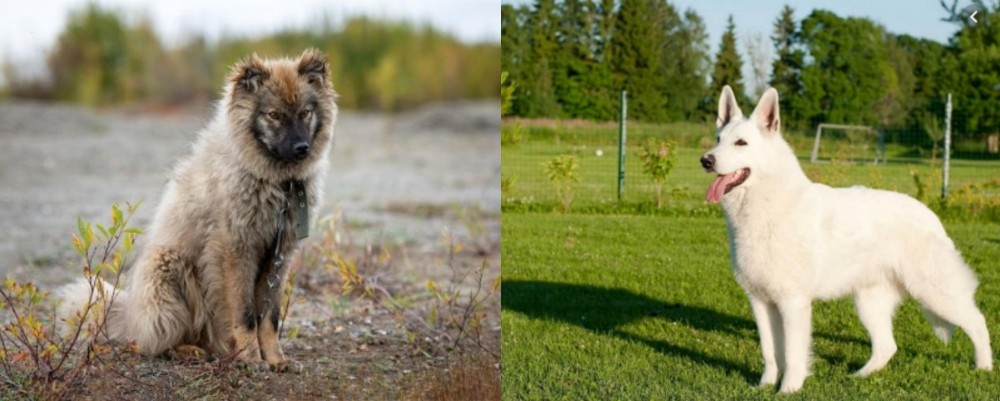 Nenets Herding Laika is originated from Russia but White Shepherd is originated from United States. Nenets Herding Laika may grow 7 cm / 2 inches shorter than White Shepherd. Nenets Herding Laika may weigh 11 kg / 24 pounds lesser than White Shepherd. Both Nenets Herding Laika and White Shepherd has almost same life span. Nenets Herding Laika may have less litter size than White Shepherd. Nenets Herding Laika requires High Maintenance. But White Shepherd requires Moderate Maintenance
Nenets Herding Laika is originated from Russia but White Shepherd is originated from United States. Nenets Herding Laika may grow 7 cm / 2 inches shorter than White Shepherd. Nenets Herding Laika may weigh 11 kg / 24 pounds lesser than White Shepherd. Both Nenets Herding Laika and White Shepherd has almost same life span. Nenets Herding Laika may have less litter size than White Shepherd. Nenets Herding Laika requires High Maintenance. But White Shepherd requires Moderate Maintenance
 There is a large variety of Laika dogs as the word is almost a generic term for a type of Russian hunting dog. They are found in Northern Russia and Siberia and there are several recognized by the Federation Cynologique International including the East Siberian Laika, the Russian European Laika, and the West Siberian Laika. These Siberia Laika are crosses between the aboriginal dogs of Siberia and northern Russia. The word Laika means a barking dog and comes from the word meaning to bark. These laikas are working dogs, hunting pointers that were bred specifically for their barks.
There is a large variety of Laika dogs as the word is almost a generic term for a type of Russian hunting dog. They are found in Northern Russia and Siberia and there are several recognized by the Federation Cynologique International including the East Siberian Laika, the Russian European Laika, and the West Siberian Laika. These Siberia Laika are crosses between the aboriginal dogs of Siberia and northern Russia. The word Laika means a barking dog and comes from the word meaning to bark. These laikas are working dogs, hunting pointers that were bred specifically for their barks.
All the dogs in this category are loyal and affectionate. They are hard workers and hunters/herders and sled dogs. Of the official Laika groups including the Nenets Herding Laika, there is the Karelo-Finnish Laika, the Northeasterly Siberian Laika, the West Siberian Laika, The Russian European Laika, Eastern Siberian Laika. The Laika are wary of strangers, noisy and rowdy.
The Laika breed known as the Nenets Herding Laika is also called the Reindeer Herding Laika. The breed is pretty ancient, developed by the Nentry tribe at about the same time that the nomads were developing the Samoyed. Like the Samoyed breed, the Nenets Herding Laika herded Reindeer. The artic breed originates from Russia and can be used for transportation and hauling as well.
While their temperament and history are very much the same as the Samoyed, they are recognized as separate breeds. However there are many aficionados of both breeds believe that the Samoyed and the Nenets Herding Laika are the same breed. For many the Samoyed are simply a white version of the Nenets Herding Laika.
The Nenets Herding Laika is also know as the Samoyed Laika, so you can see how close if not the same, these two breeds are. The Nenets Herding Laika was bred by the Nenet peoples. The Samoyed is all white while the Nenets is any variation of black, gray, piebald, red, white, sable and brown.
The dogs herd and guard reindeer, keeping the herd together and moving them from one pasture to another. They will also stay with a stray reindeer until they are found. They will do this whether they have food or water. They will bark to try to bring the people’s attention to the lost reindeer. They are also an excellent hunting and retrieving, swimming dog.
The Nenets are also known as Yurak Samoyeds and they are the largest group of Samoyedic peoples today. They live on both sides of Russian Ural Mountains in northern Russia and the Yamal Peninsula. They move large herds of reindeer to the winter lands south of the Artic Circle from the north – about 600-900 miles. It is believed that the Herding Laika originated with this group of people but spread beyond them. They were shipped to far northeast Siberia to be bred and shared with reindeer herding tribes there.
There is a longhaired or rough coated variety and a shorthaired variety. The Nenets consider the work routine of both varieties the same, but they believed that the shorthaired version was a more ancient than the longhaired version.
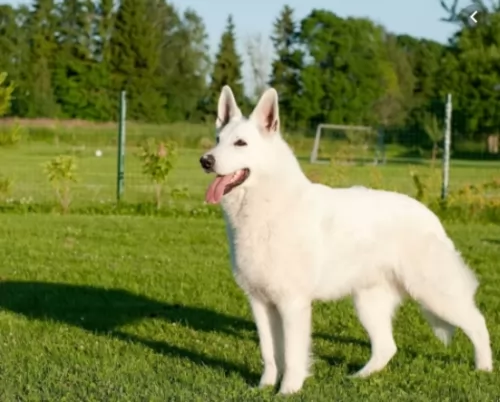 The German Shepherd and the white German Shepherd are the same dog - the only thing is that their coat colors vary.
The German Shepherd and the white German Shepherd are the same dog - the only thing is that their coat colors vary.
The White Shepherd evolved because people were looking for a working companion dog with a high degree of intelligence and a white coat.
The development of the White Shepherd began at the time of the 19th and 20th centuries. A breeding program was started but in 1933, the white coat color was made a disqualification in the German Shepherd Dog breed standard.
Not to be deterred, it was in 1969 that the U.S. and Canada formed White German Shepherd breed clubs and the breed was actually recognized by the UKC in 1999.
 This is a medium sized dog , muscular and strong. Slightly smaller than the Samoyed, the Nenets Laika weighs about 40-55 pounds and is 18 inches tall. The ears are typical Spitz ears and the tail is carried up over the back. The Nenets Herding Laika can have gray, piebald, black or tan coats and some can be solid white and look just like a Samoyed. The coat is a thick, double coat with the undercoat very wooly.
This is a medium sized dog , muscular and strong. Slightly smaller than the Samoyed, the Nenets Laika weighs about 40-55 pounds and is 18 inches tall. The ears are typical Spitz ears and the tail is carried up over the back. The Nenets Herding Laika can have gray, piebald, black or tan coats and some can be solid white and look just like a Samoyed. The coat is a thick, double coat with the undercoat very wooly.
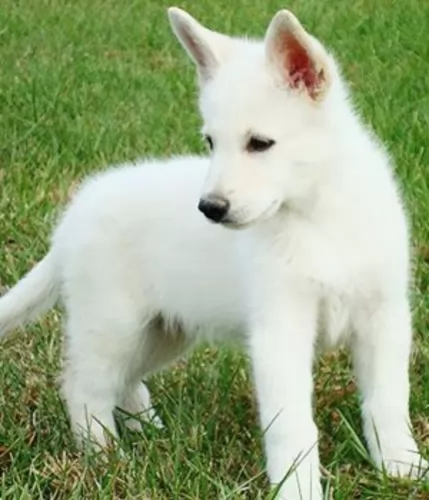 The White Shepherd is a true beauty and is a medium to large-sized dog that is muscular and strong. He stands at between 55 and 65cm in height and weighs between 35 and 40kg.
The White Shepherd is a true beauty and is a medium to large-sized dog that is muscular and strong. He stands at between 55 and 65cm in height and weighs between 35 and 40kg.
He is somewhat longer than tall. The double coat is medium length, dense, straight and white. He is a fairly heavy shedder. He has an intelligent face, a long muzzle and erect ears. The long tail is low-set.
This beautiful dog’s face tells you that he is highly intelligent. He can be easily trained. The bright eyes are eager and alert and he is ready to be an excellent guard dog and take his role as protector and guardian seriously.
The White Shepherd loves his human family and isn't overly enthusiastic around strangers. They’re playful dogs and will make great playmates for children. They also aren’t aggressive with other dogs and will get on well with other pets in the house.
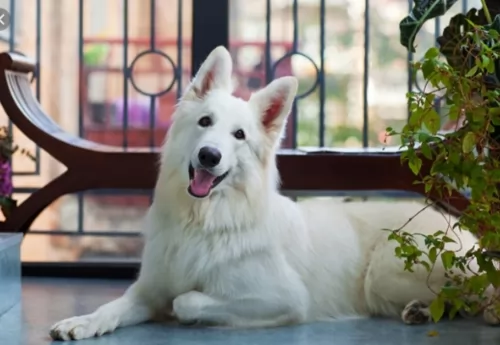 The White Shepherd is such a beautiful dog and he has some great characteristics to match his good looks.
The White Shepherd is such a beautiful dog and he has some great characteristics to match his good looks.
He is friendly and amicable with his human family and is a great protector as well. He isn’t aggressive yet he makes a great watchdog.
He is loving and loyal and forms strong bonds with his human family. Bringing him into your home and heart is guaranteed to confirm the opinion held that dogs are man's best friend.
 For the most part the Nenets Herding Laika is a healthy breed and very hardy. They do however have some propensities for some illnesses and conditions.
For the most part the Nenets Herding Laika is a healthy breed and very hardy. They do however have some propensities for some illnesses and conditions.
Diabetes Mellitus – can be treated with medication and is usual seen in middle age -after 7 years of age.
PRA – Progressive Retinal Atrophy – Slow loss of vision and this is a genetic disease – leads to blindness.
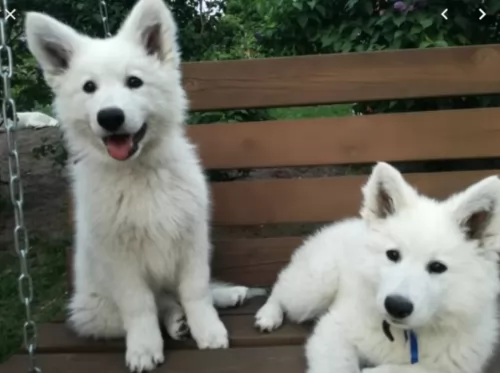 The White Shepherd shares health problems much the same as the German Shepherd, and one of these is hip dysplasia.
The White Shepherd shares health problems much the same as the German Shepherd, and one of these is hip dysplasia.
These dogs are at risk of getting hip dysplasia. It’s a congenital disorder with dogs inheriting the disease from their parents. Some young dogs can get the disease too. Because they are such active dogs, the White Shepherd is at risk of dysplasia. There are a number of signs you can look for in your dog and some of these are -
Your vet may want x-rays to examine your dog's hips. Your vet will want to slow the development of the disease and also ease the pain in your pet. There are other steps the vet will suggest to you that can make it as comfortable as possible for your pet.
 Be careful that your pup doesn’t grow too fast. They are open to injuries if they grow too fast. Low calorie with protein and not a lot of fat. half a cup of high quality medium breed dog food 3X a day.
Be careful that your pup doesn’t grow too fast. They are open to injuries if they grow too fast. Low calorie with protein and not a lot of fat. half a cup of high quality medium breed dog food 3X a day.
1 1/2 cups high quality medium breed dog food.
athletic and agile
At leaset a walk or two every day. Don’t get overheated as they are used to cold weather. Would be good at agility and herding exercise.
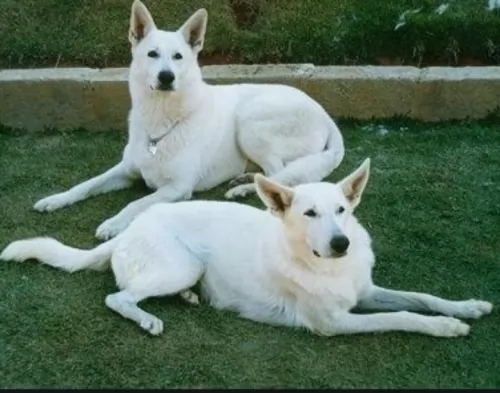 The White Shepherd's weather-resistant double coat will need to be brushed regularly as he is quite a heavy shedder. When brushing him, check for ticks and fleas as well as any unusual lumps.
The White Shepherd's weather-resistant double coat will need to be brushed regularly as he is quite a heavy shedder. When brushing him, check for ticks and fleas as well as any unusual lumps.
This beautiful dog was developed from a herding breed so he is very active. He will love a walk every day but that won’t be sufficient. He just loves ball games, and if you take him to the park, he’ll love you throwing sticks for him or the frisbee.
Because of his intelligence, he will require mental and physical stimulation. You get some toys for dogs where you can put some kibble in the toy and he has to figure out a way to get the food out.
The White Shepherd is an active dog, so to keep him that way, ensure he gets good food which has the right balance of vitamins.
There are good commercially manufactured dog foods on the market, but the idea is to know how to choose the high-quality ones and to avoid the ones that can actually jeopardize your dog’s health.
Always read the write-up on the packaging and choose according to your pet’s age and his activity levels.
It is always a good idea to give such a dog some home-made food too. Not any kind of home-made food either because you have to be careful with dogs to avoid them suffering from abdominal pain. They like their food plain and simple – boiled chicken, brown rice and vegetables.
Some raw meat occasionally is also good. Don’t forget to ensure a constant supply of cool, fresh water.